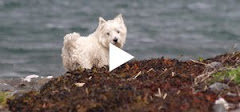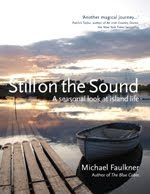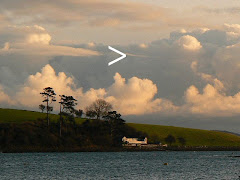Most of the comments I have received about Thursday's One Show piece on Islandmore - on the blog, on the street, and by text and email - have had a common thread. They talk about "a tribute to your father".
I wasn't consciously paying tribute, but if viewers came away with the feeling that my father was an honourable man on whom circumstances forced the most appallingly difficult decisions; that these decisions were not taken lightly; and that only one thing - his family - meant as much to him as a peaceful future for Northern Ireland, then I'm happy enough, my sole reservation being that I would like to have seen a mention of my books (as would my father, I'm pretty sure, had he still been with us). Having said that, I can't complain because the director laid out the storyline before we started, and I was forewarned.
Within the limitations, then, of its quite narrow focus (the most difficult decision my father ever faced) I think the film was very fair; but it would be a great pity if some were left with the impression that the events of summer 1971 defined Brian Faulkner's political career. A much truer legacy, and a better reflection of the man, can be found in 1973/4, when he was the principal architect of the power-sharing executive of which he became Chief Executive. He believed passionately that inclusive politics at the highest level was the only way forward for Northern Ireland, and although the Executive was fatally wounded by extremists after just a few months, it had blazed a brave trail which would eventually be revisited by the authors of the Good Friday Agreement of 1998 (the foundation of the current period of relative peace) - the constitutional provisions of which were essentially the same. As I mentioned in The Blue Cabin, the collapse of the Executive was one of the few events of my father's political career which caused him - ever the optimist - to look backwards with regret, and forwards with foreboding. He was vindicated in both by the twenty-five years of conflict which followed.
As to the family man, this is what one correspondent (who never met my father) had to say after watching The One Show on Thursday:
"The evident warmth of your own affection and respect contributed a lot to [the film] and one was made very aware of the importance of his family to him and how much happy family holidays must have meant in such difficult times." He added that he saw in my father "a warm, open, friendly, gentle character." Delightful comments from a delightful - and insightful - man!
I want to just add two little stories from different women who attended a recent talk I gave on island life.
One was the telephonist at Stormont while my father was PM. She said that she always knew when parliamentary sessions ended because the first call she was asked to put through was on my father's behalf. So often had this woman put the call through that she said to me, 'Your home number was Seaforde 663, wasn't it?' Incredibly enough, it was. And of course I could have told her that my father never liked to be out of touch with my mother, or with family happenings in general.
The second woman had been a Private Office secretary at Stormont Castle. She used to take shorthand from my father, and apparently when he was finished, he invariably said, 'Thank-you very much Miss X', got up from his desk and opened the door to see her out. She said that in her experience, no-one else at Stormont did the same.
I posted this short video, The Blue Cabin: Images of the Seventies to YouTube a while ago:















